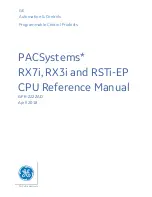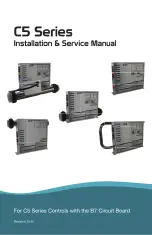
22
3
System Description
3
System Description
The CMS is a failsafe modular burner control system that can be customised to control com-
bustion systems from simple single fuel burners to complex multi-fuel burners with up to four
fuels. The minimum possible configuration is a single MCC which cam provide the functionality
of a burner sequencer with bus interface.
The burner sequencer is equipped with:
•
1 input for a flame sensor
•
12 failsafe digital inputs
•
9 failsafe digital outputs
•
1 non-failsafe analogue input
•
1 non-failsafe analogue output
With the help of configuration software, the inputs and outputs can be assigned required to
predefined functions for a gas burner (e.g. air pressure monitor, gas pressure monitor for valve
leakage test, minimum gas input pressure, etc.). With an oil burner, the terminal assignment
may differ from that for a gas burner.
The input for the flame sensor can be configured as appropriate for optical flame sensors
FFS07 and FFS08 or for ionisation monitoring.
In the full configuration, the following can be integrated within the CMS:
•
1 flame sensor
•
60 failsafe digital inputs
•
41 failsafe digital outputs
•
10 control channels for the electronic ratio control
•
9 failsafe analogue inputs or 18 non-failsafe analogue inputs
CO/O
2
control for the burner is also possible using a suitable LAMTEC flue gas analyser/
probe combination.
Devices available for configuring parameters and operating the system include the graphical
user interface UI400 as well as the touch screen panels GUI607, GUI610 and GUI615 (in
three separate sizes).
CMS Remote Software is also available.
3.1
Brief Description
The CMS can adjust up to 10 control output channels defined in user-programmable curve
sets to modulate the burner through the firing range. The firing rate can be defined using in-
ternal PID control or can be set from an external tracking signal (4-20 mA or Fieldbus).
In the standard configuration, 2 curve sets (e.g. for oil or gas) can be stored. In addition, up to
16 curve sets are optionally available.
Up to 4 fuels can be defined.
Up to 10 control element outputs can be defined, e.g.
•
Fuel valve
•
Flue gas fan
•
Flue gas damper
•
Recirculation fan
•
Combustion air damper
•
Combustion air fan
•
Atomiser steam
Summary of Contents for AEC-TPS
Page 2: ......
Page 131: ...130 7 Operating Control and Displays 7 1 5 5 Deleting Curves Delete firing rate curve...
Page 148: ...147 7 Operating Control and Displays Channel configuration AL1 Fig 7 18 Channel configuration...
Page 157: ...156 7 Operating Control and Displays Fig 7 27 System CRCs menu...
Page 162: ...161 7 Operating Control and Displays Fig 7 32 IP setting menu...
Page 166: ...165 7 Operating Control and Displays Fig 7 35 Installation...
Page 167: ...166 7 Operating Control and Displays Fig 7 36 Installation...
Page 176: ...175 7 Operating Control and Displays Fig 7 49 Loading a protected dataset into the device...
Page 202: ...201 7 Operating Control and Displays Replacing a Module Fig 7 81 Module replacement menu...
Page 276: ...275 10 Maintenance 3 Restart CMS to complete the update...
Page 282: ...281 12 Appendix 12 5 EU Declaration of Conformity...
Page 283: ...282 12 Appendix...
















































